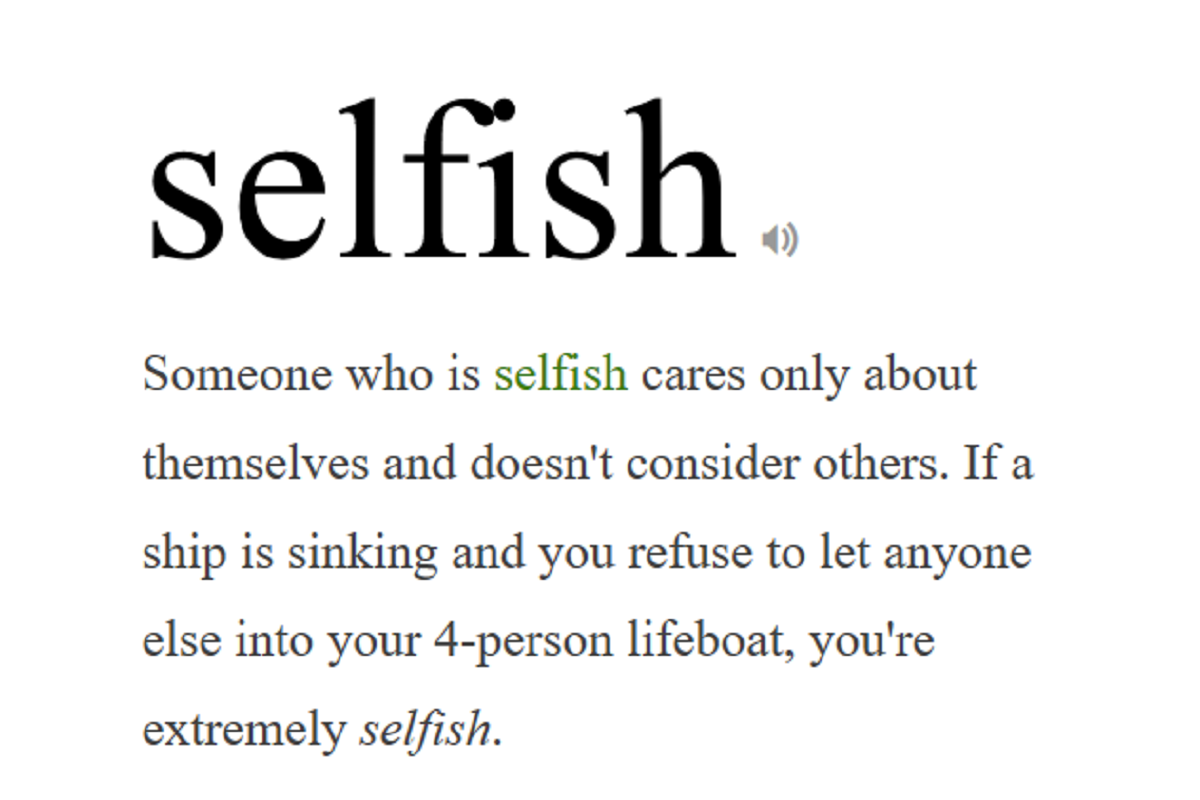The term selfishness is not, although it may seem the opposite, synonymous with selfishness; it was certainly used in a similar sense in literature before the nineteenth century, but in the field of psychology its current meaning is different (although it also relates to the concept of “I”, the “I”), the selfish being the one who takes care of his interest, regardless of others ?.
According to the SAR, selfishness is an “exaggerated feeling of one’s personality,” while Wikipedia states that “one can identify with the concept of excessive importance given to oneself and one’s own life experiences. “It could also be described as an insatiable desire to show others its own importance, regardless of whether selfishness has reason to attach such importance (although this is often not the case).
- The selfish is a person who pays no attention to what happens to his environment.
- Nor to the needs of the people who live with him.
- Considering that his own problems and needs are above others: the lack of empathy leads him to see others as a means to an end (his end).
- Extreme selfishness is also a hallmark of type B personality disorders.
- Particularly histrionic and narcissistic disorders.
Trusting oneself is a necessary attitude, no doubt, to follow the path of success, on the other hand, increases the dose and you will become presumptuous, someone who assumes that everyone is wrong and who is unable to recognize the achievements of others.
The selfish one loves himself, many, and every now and then he throws jokes like “I don’t deny it: are there times when I speak to myself?Why do I sometimes need expert advice?You’ll say it with a laugh, but for him it’s not a joke. In short, selfishness prevents you from learning more about yourself. Why would someone who already thinks it’s perfect bother to change?In this sense, it is worth remembering that, in the words of Jillian Michaels, “a bad day for your ego is a good day for your soul. “
The egoist spends a lot of time thinking about the great things that he imagines to achieve in the future, about projects based more on the impression of others than on reality, even when they have a real basis, they embellish them to increase interest in what count. In general, they tend to exaggerate and dramatize most aspects of their lives.
A selfish person only takes into account his vision of things and demands that others act on the same basis. A selfish person generally believes that he knows exactly how things should be done and how others should behave. When things don’t go “as they should,” the resulting sense of loss of control can make you feel angry and defensive.
Are these people the ones who don’t accept them? In response, the gap is considered an aggression and they are able to disturb the tranquility of those around them, until everything goes as they wish.
This seems contradictory to the previous one, but it is not: these are people who try to hide their own insecurity (and avoid the rejection they believe it implies) by presenting themselves as more competent than they really are. They keep an image they think is perfect. Above all, they try never to lose control of the situation or, ultimately, not to give others the impression of losing.
Selfishness is also one of the neurotic mechanisms provided for by Gestalt therapy: its main function is to increase and strengthen the contact front through narcissistic enlargement of the ego, that is, through a defensive increase in the self at the expense of the other.
This mechanism is provided by Gestalt Therapy during the therapeutic process, while the person is responsible for their needs, that is, for a while, would it be in this current?A necessary step to decrease inhibition and encourage self-support. is a mechanism that must be dissolved at the end of the therapeutic process.

